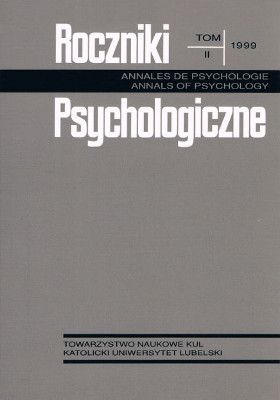Accepting the Perspective of the Spouse as Regards his or her Momentous Decision
Abstract
The research sought to answer the question whether the duration of a marital relationship affects the spouse's ability to accept his or her partner's perspective. This has been done on the basis of the process of a momentous decision.
25 couples have been examined in each of the three different stages of marital life (group A = 0-4 years of marital life, group B = 5-18 years and group C = more than 18 years). They all varied as regards the number of children. The data have been gathered by means of three questionnaires for examining momentous decisions, referring to three perspectives (simple, metaperspective and meta-metaperspective), all of them based on the determined domains of the decision-making process. In order to study essential differences between the results test x2 has been used. Taking into consideration the degree of the agreement of beliefs between the spouses as regards the duration of their marriage, t-Student test has been used.
The duration of marriage has turned out to be an essential factor as regards awareness and usefulness. Assuming meta- and meta-metaperspective has turned out to be most varied among the couples who have lived together the longest time. At the sam time this group was most capable of accepting the partner's perspective.
References
Batson C. D. (1997). Self-other merging and the empathy – altruism hypothesis. Journal of Personality and Social Psychology, 73, 517-522.
Braun-Gałkowska M. (1976). Psychospołeczne uwarunkowania powodzenia małżeństwa. Roczniki Nauk Społecznych, 4, 210-236.
Braun-Gałkowska M. (1980). Psychiczne uwarunkowania powodzenia małżeństwa. Warszawa: PWN.
Cedro E. (1984). Rozumienie pełnej religijności przez wybrane grupy młodzieży. Mps Arch. KUL.
Cieślak K. (1989). Geneza i rozwój podejścia interakcyjnego w badaniach małżeństwa i rodziny. Problemy Rodziny, 6, 37-48.
Cohen M. S. (1993). Three paradigms for viewing decision biases. [W:] G. A. Klein, J. Orasanu, R. Calderwood, C. Zsambok (red.), Decision making in action: Models and methods. New Jersey: Ablex Publishing Corp., s. 233-259.
Coleman J. (1980). The nature of adolescence. New York: McGraw-Hill.
Davis M., Conklin L., Smith A., Luce C. (1996). Effects of perspective taking on the cognitive representation of persons. Journal of Personality and Social Psychology, 70, 713-726.
Harvey J. H. (1987). Attributions in close relationship: Research and theoretical developments. Journal of Social and Clinical Psychology, 5, 420-434.
Janicka I. (1993). Empatia a poziom otwartości partnerów. Przegląd Psychologiczny, 1, 29-48
Janis L. J., Mann K. (1977). Decision making. A psychological analysis of conflict, choice and commitment. New York: Wiley.
Jurczyk L. (1984). Ideał chrześcijanina w rozumieniu młodzieży (mps Arch. KUL).
Kelly E. L., Conley J. J. (1987). Personality and compatibility. A prospective analisys of marital stability and marital satisfaction. Journal of Personality and Social Psychology, 52, 27-40.
Laskowski J. (1987). Trwałość wspólnoty małżeńskiej. Warszawa: PWN.
Long E. C. (1993). Perspective-taking differences between high- and low- adjustment marriages: Implications for those in intervention. The American Journal of Family Therapy, 21, 248-259.
Long E. C., Andrews D. W. (1990). Perspective taking as a predictor of marital adjustment. Journal of Personality and Social Psychology, 59, 126-131.
Łobodzińska W. (1974). Rodzina w Polsce. Warszawa: WSiP.
Markus H. R., Kitayama S. (1991). Culture and the self: Implications for cognition, emotion and motivation. Psychological Review, 98, 2, 224-253.
Murray S. L., Holmes J. G., Griffin D. W. (1996). The benefits of positive illusions: Idealization and the construction of satisfaction on close relationship. Journal of Personality and Social Psychology, 70, 79-98.
Neuberg S. L., Cialdini R. B., Brown S. L., Luce C., Sagarin B. J. (1997). Does empathy lead to anything more than superficial helping? Journal of Personality and Social Psychology, 73, 510-516.
Ożarowska M. (1991). Przyjmowanie perspektywy partnera małżeńskiego w zakresie jego decyzji życiowo doniosłej. Studium porównawcze kobiet i mężczyzn (niepublikowana praca doktorska, mps Arch. KUL).
Ożarowski W. (1991). Przyjmowanie perspektywy partnera w dokonywaniu decyzji życiowo doniosłej. Badania empiryczne małżonków o różnym czasie trwania związku (niepublikowana praca doktorska, mps Arch. KUL).
Payne J., Bettman J. R., Coupey E., Johnson E. J. (1993). A constructiv process view of decision making: Multiple strategies in jugdement and choice. [W:] O. Huber, J. Mumpower, J. van der Pligt, P. Koele (red.), Current themes in psychological decision research. Amsterdam: North-Holland, s. 121-143.
Pfister H. R., Bohm G. (1992). The function of concrete emotions in ratial decision making. Acta Psychologica, 80, 199-211.
Rostowski J. (1987). Zarys psychologii małżeństwa. Psychologiczne uwarunkowania dobranego związku małżeńskiego. Warszawa: PWN.
Rożnowska A. (1987). Zależność spostrzegania osób od płci przedmiotu oraz podmiotu spostrzegania. Słupsk: Wydawnictwo Wyższej Szkoły Pedagogicznej.
Shestowsky D., Fabrigar L. R., Wegener D. T. (1998). Need for cognition and interpersonal influence: Individual differences in impact on dyadic decisions. Journal of Personality and Social Psychology, 74, 1317-1328.
Thomas G., Fletcher G. J., Lange C. (1997). On-line empathic accuracy in marital interaction. Journal of Personality and Social Psychology, 72, 839-850.
Walesa Cz. (1978). Rozwój zgodności przekonań religijnych i praktyk współmałżonków oraz jej związki z zadowoleniem z małżeństwa. Roczniki Filozoficzne, 26(4), 91-113.
Walesa Cz. (1987). Psychologiczna analiza decyzji życiowo doniosłych. Lublin: RW KUL.
Ziemska M. (1977). Rodzina a osobowość. Warszawa: PWN.
Copyright (c) 1999 Roczniki Psychologiczne

This work is licensed under a Creative Commons Attribution-NonCommercial-NoDerivatives 4.0 International License.


